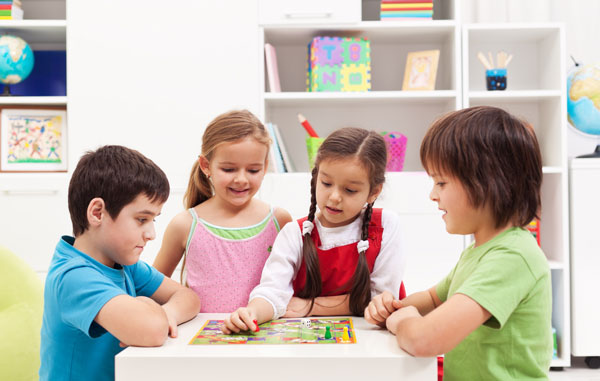
Early on in development, most children learn to coordinate their own body and mind, as well as interpret the words and actions of others to participate with increasing sophistication in order to communicate. As is true with walking, sometimes, the skill needs a little bit more help with its development. The same is true for social skills. Some kids can just do it, and some need some coaching.Social skills groups can offer many benefits for some children. However, sometimes they are not
the most effective for children. But through individual identification of the different skills with your child’s therapist, different social skills can be worked on and mastered. Sometimes, social skills groups can be overwhelming for a child who is struggling with this area, making generalization of the skills very difficult.
What Are Social Skills, Anyway?
Social skills are those communication, problem-solving, decision making, self-management, and peer relations abilities that allow us to initiate and maintain positive social relationships with others. Deficits or excesses in social behavior interfere with learning, teaching, and social climate. Social competence is linked to peer acceptance, teacher acceptance, inclusion success, and post school success.Playdates?
Although they sound like a luxury, it’s important It is important for parents to bring their infants and toddlers together with other children. Even though the interactions may seem parallel at first, that’s okay.
As toddlers and up until kindergarten, children gain most of their skills through playing. This is how they explore the world around them and make sense of routines and relationships. It is up to you as a parent to reinforce those skills by giving your child positive feedback. This helps her feel confident and secure.
Give Those Feelings a Name
We are not born knowing what we feel or what these feelings are called. Even at age one, when your child does not have a big vocabulary, label your child’s feelings and mirror their emotions with your own facial expressions and body language.
Through your discussion of how they feel, they begin to learn words associated with those feelings and can later use those words to talk out their feelings. This will help them transition to talking about feelings instead of acting out their frustrations. To teach emotions, Michelle Garcia Winner’s Social Thinking strategy, titled “Zones of Regulation” teaches children to recognize their thoughts and feelings in a given situation.
Michelle Garcia Winner is the CEO and creator of Social Thinking, a program created to help children and well as adults develop their social communication skills. She emphasizes learning effective communication skills by managing multiple systems at once: mind, body, eyes, and language. The importance is simultaneously engaging all these systems and interpret not only our own responses, but interpret the same systems of others as well.
The Four Steps of Communication
Step 1: Think about other people’s thoughts and feelings as well as your own.
To successfully communicate, we have to take the perspective(s) of the other person with whom we are communicating. Effective communication requires all participants to be thinking (most of the time) about the same topic/idea and for the thoughts to stay connected (even if not mutually agreed upon) throughout the communicative exchange.
Step 2: Establish physical presence; enter with your body attuned to the group.
Effective communication typically requires people to not only stand about one arm’s length of each other (physical proximity) but to also have a physical stance/posture that conveys a willingness to interact and an emotional calm.
Many children with a disability enter a social situation with a rigid stance and this is interpreted by others as being unfriendly or uncomfortable when approaching other people. It’s important that we teach not only about physical proximity but also about physical relaxation when communicating with others. Being relaxed is social situations gives others comfortable feelings and good thoughts about us!
Step 3: Think with your eyes.
Teaching eye contact from a purely physical, functional perspective can hurt as much as help children in social situations. Instead, we need to teach students to “think with their eyes” – meaning, to use their eyes enough to monitor how people are feeling and what they may be thinking (based on what they are looking at) during social encounters. Using our eyes can help children understand when and how to approach a conversation with a group of people. If two grown-ups are having a conversation and the child interrupts, it can be helpful to have the child use this technique to understand the social situation. When it is appropriate to engage in conversation, we then watch others’ eyes to gauge conversation direction and flow and follow who is speaking to whom.
Step 4: Use your words to relate to others.
Language is the way we share our thoughts with others. Just as in Step #1 we try to keep our thoughts connected while communicating together, we also must keep our language connected to whatever is being discussed. Those who don’t keep their language “on topic” are considered self-centered, aloof, unfriendly and/or ineffective in their communicative attempts. We must teach students communication strategies such as asking questions, adding a thought, showing interest, etc. based on the conversation at hand and what they think other people are thinking about.
Start to use these basic strategies with your child to enhance their executive functioning and build meaningful connections with others!
